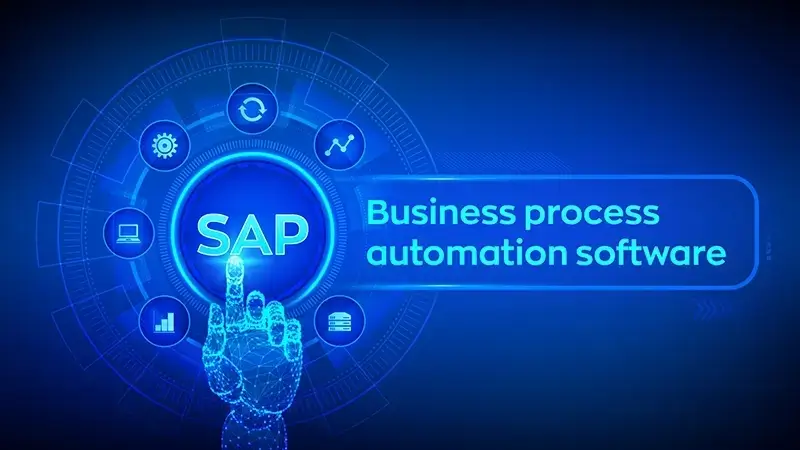SAP Business One Pricing & Costs (USA)
Businesses must clearly understand the different pricing and cost factors involved in implementing and maintaining SAP Business One to make an...
SAP stands for Systems, Applications, and Products in Data Processing. SAP was developed by one of the world's largest software companies, known as SAP. Yes, both the company and the system share the same name. SAP is headquartered in Walldorf, Germany, and has been the market leader in enterprise resource planning (ERP) for 30 years. The SAP system comes with multiple features and benefits, as you'll see below.
An ERP integrates the core functions of a company's core business processes into a unified system. ERP covers all areas of the business by centralizing data management.
An ERP can manage all the information about your company's products, clients, suppliers, and employees. This allows you to support and integrate business processes across functional boundaries within your company.
There are some key ERP features that your organization shouldn't be without:
SAP systems consist of a series of fully integrated modules that can help you streamline business processes within any department, connecting not only your employees but also their ideas. These modules include human resources, finance, sales, and more. They also offer the broadest range of functionalities on the market to help your company make management decisions. The feature that makes SAP the best solution available on the market is its ability to adapt to a company's specific requirements.
SAP can help your company's employees across all departments access ERP software data from any location and device. This is because the data is stored in a centralized location. This enables better collaboration and communication across departments in your organization. It also makes workflows more consistent, helping to streamline task completion. As a result, you can better track processes and make more informed decisions.
The SAP system eliminates repetitive operations, meaning you don't need to enter data manually. This can help improve your overall productivity. It also reduces the chances of inaccurate data that could result in costly errors.
Perhaps its most impressive feature is its highly customizable nature. Every business is different and has its own unique needs. Thanks to SAP's flexibility and adaptability, you can tailor the software to your company's requirements. It comes with several system modules for different departments.
SAP ERP software ensures your company has a unified reporting system for every process. Using one source of accurate and up-to-date data allows for more useful analysis and reporting at all times, without the help of an IT expert. With this system, you can better compare and analyze the work of different departments, eliminating the need for emails and spreadsheets.
The system provides enhanced data protection through integrated security systems and firewalls. SAP software features offer automatic backup to prevent any failures. When it comes to cloud solutions, it's especially vital to have software that can be replicated in separate locations.
You can use SAP ERP to collect and process data from all functions. This goal is achieved all within a single platform. This means you don't have to use multiple software solutions to perform various tasks. For example, you can manage customer relationships and track your finances, all in one place. Let's take a closer look at SAP's features.
If you are a project manager, you can use SAP project management tools to help you manage projects from start to finish. You can direct resources and funds where needed, as well as monitor each stage of the project to ensure it's delivered on time and within budget. As a project manager, you can define a start and end date for a project and organize each project stage into a structure. This allows you to separate the main project into individual tasks. You can integrate the project management system within SAP with other SAP components for seamless data access and management.
With SAP HR software, you can automate record-keeping processes. Human resource management modules include:
Organizational Management: Allows you to create organizational structure reports, track positions across various departments, maintain jobs, report relationships, and more.
Personnel Management: Records essential employee information and allows you to perform administrative tasks (i.e., hiring employees, managing travel expenses, etc.).
Time Management: Allows you to monitor shifts, attendance, work schedules, and holiday calendars.
Payroll Accounting: Helps you process payments for work performed by employees. You can also integrate the payroll module with other modules such as personnel administration, time management, and financial accounting.
Travel Management: Helps you manage official trips, travel expenses, etc.
With SAP, warehouse managers are equipped with everything they need to run a successful warehouse. This includes inbound and outbound processing management, operations and warehousing management, and cross-functional management functions (i.e., batch management, serial number management, dock appointment scheduling, etc.).
SAP can help your company's marketing and sales teams streamline processes by eliminating manual tasks through automation. The SAP CRM module includes several features, such as:
Sales CRM
Marketing CRM
Customer Service CRM
Commerce CRM
Within the system, you'll gain access to various financial management and accounting features that will help you keep track of your finances. This includes financial planning and analysis, accounting and tax management, treasury management, and accounts payable and receivable.
An ERP can make your life easier by providing your business with improved business reporting, improved inventory costs, better data and cloud security, and improved business processes. As a result, you can save more time and get more done.
For growing companies or in the process of international expansion, SAP Business One represents a scalable solution prepared to operate in multiple currencies, languages, and regulatory frameworks. This makes it an ideal tool for businesses with global or multinational operations.
Although SAP is known for its presence in large corporations, SAP Business One was specifically designed for small and medium-sized businesses (SMEs) looking to professionalize and scale their operations. This ERP is used in sectors such as:
Its sector-specific adaptability allows for the implementation of customized configurations based on the business line.
SAP Business One includes business intelligence (BI) tools that allow you to generate visual reports and interactive dashboards. These features allow you to:
In addition, it can be integrated with more robust analysis tools such as SAP Analytics Cloud or Power BI.
Adopting SAP Business One is not just a technological decision, but a strategic commitment to the sustainable growth of your company. In an increasingly competitive and digitalized business environment, having a robust, flexible ERP solution designed to support every stage of your operation can make all the difference. Evaluating how your key processes are managed today—and to what extent they could be optimized—is the first step toward real transformation. If you're ready to take the efficiency, visibility, and control of your business to the next level, the time to take the next step is now.
At H&CO, we can assist you with the implementation and integration of SAP Business One, tailored to your company's specific needs.

Businesses must clearly understand the different pricing and cost factors involved in implementing and maintaining SAP Business One to make an...

Implementing SAP Business One has become a crucial aspect for many companies looking to enhance their operational management. If you have decided to...

In today's fast-paced business environment, small businesses need efficient and reliable tools to manage their operations and stay competitive. One...
